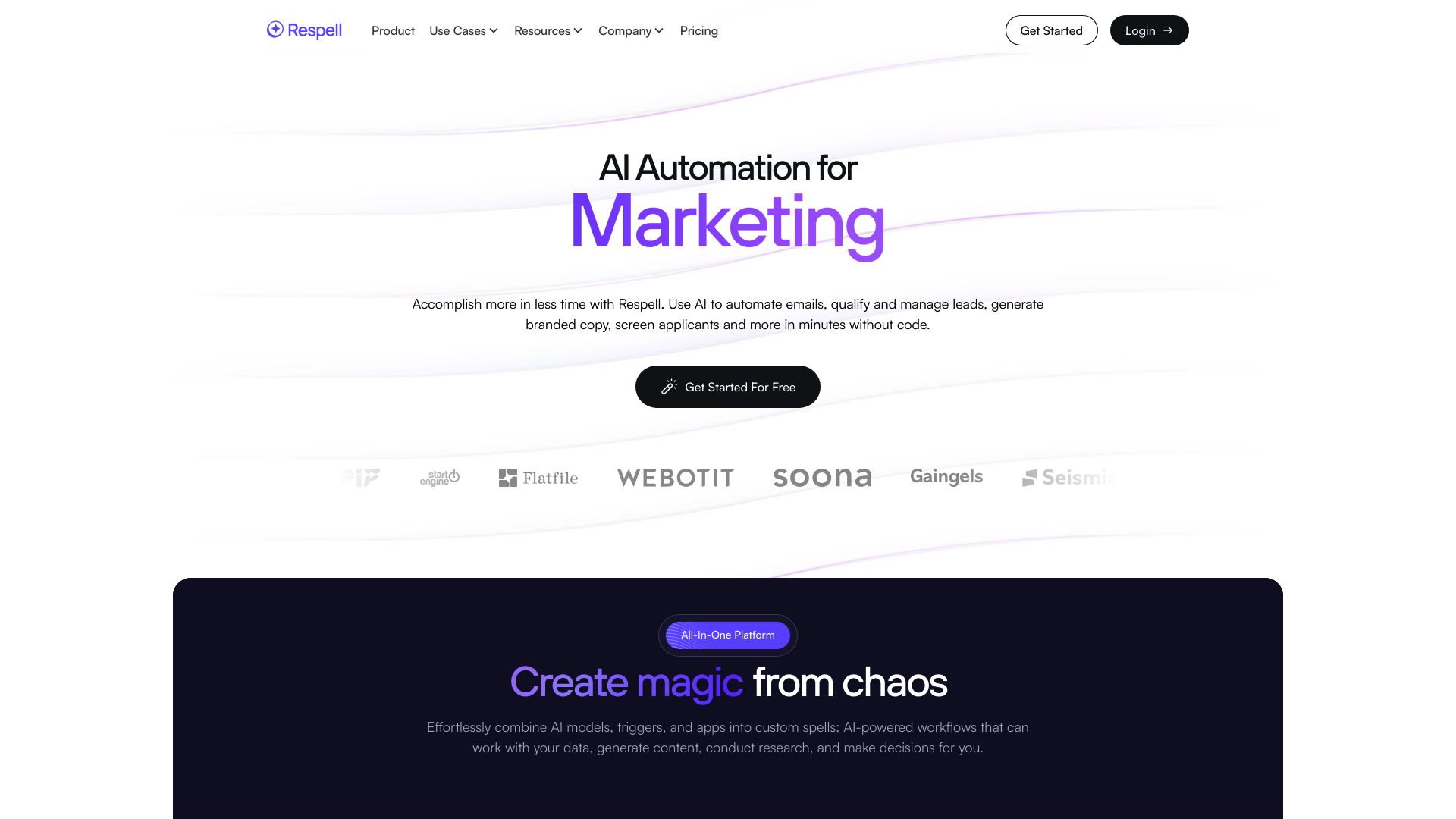Respell vs. DevGPT: AI-Powered Development Tools Compared
AI-powered development tools revolutionize how we build software and automate workflows. This review compares Respell, a no-code platform for creating AI workflows, with DevGPT, an open-source tool for AI-assisted coding. We’ll explore their key features, strengths, and limitations to help you choose the right solution for your needs. Whether you’re a developer seeking to streamline coding tasks, a business leader looking to enhance productivity, or an AI enthusiast exploring new possibilities, understanding these platforms is crucial. We’ll also introduce SmythOS, our comprehensive AI development platform that combines the best of both worlds and offers unparalleled flexibility and power.
Respell Overview
Respell empowers users to create sophisticated AI workflows and agents without coding expertise. The platform’s visual Spell Studio enables drag-and-drop construction of AI-driven processes, making advanced automation accessible to a wide range of professionals.
Respell empowers users to create sophisticated AI workflows and agents without coding expertise.


Respell’s standout feature, Elle AI Assistant, acts as an intelligent collaborator. Elle guides users through the platform, suggests workflow improvements, and even builds spells autonomously. This AI-powered assistance streamlines the creation process and enhances productivity across teams.
Elle guides users through the platform, suggests workflow improvements, and even builds spells autonomously.
The platform excels in its integration capabilities. Native connections with popular services like Airtable, Salesforce, and Slack, coupled with Zapier support, allow Respell to slot seamlessly into existing tech stacks. This versatility enables users to automate complex, cross-platform workflows with minimal friction.
While Respell offers powerful functionality, it may present a learning curve for complete beginners in AI automation. The platform’s depth of features, while advantageous for many, could initially overwhelm users new to the concept of AI workflows. Additionally, pricing information isn’t readily available on their website, potentially complicating budget planning for some organizations.
DevGPT Overview
DevGPT empowers developers to streamline their coding workflow through AI-assisted automation. This open-source tool transforms natural language descriptions into executable code, saving developers significant time on repetitive tasks.


DevGPT’s key features include personalized training on a developer’s codebase, editable AI-generated outputs, and integration with popular development tools like GitHub and Jira. The platform leverages advanced language models such as GPT-4 and Codex to power its code generation capabilities.
DevGPT’s vision centers on becoming an indispensable AI coding companion, expanding accessibility to companies of all sizes, and fostering an engaged community to drive product development.
While DevGPT offers impressive time-saving potential, with initial users reporting over 10 hours saved per week, it currently focuses primarily on individual developers and small teams. This may limit its applicability for larger enterprise environments requiring more robust collaboration features or extensive customization options.
DevGPT’s vision centers on becoming an indispensable AI coding companion, expanding accessibility to companies of all sizes, and fostering an engaged community to drive product development. However, the platform’s current state may not fully address the needs of organizations requiring advanced security features, extensive API integrations, or complex multi-agent collaborations.
As an evolving open-source project, DevGPT shows promise in enhancing developer productivity. Its focus on contextual outputs tailored to individual coding styles sets it apart from more generic code generation tools. However, potential users should carefully evaluate their specific requirements against DevGPT’s current capabilities to ensure it aligns with their development workflow and scalability needs.
Feature Comparison
Respell and DevGPT offer distinct approaches to AI-assisted development, with key differences in their core components and security features. Respell provides a comprehensive no-code platform for building AI workflows, while DevGPT focuses on code generation for developers.
Respell’s visual Spell Studio enables users to create complex AI workflows without coding, supporting multiple environments and offering extensive integration capabilities. It includes features like multi-agent collaboration, human-AI interaction through Elle AI Assistant, and deployment options as APIs or chatbots. Respell also provides robust security measures, including data encryption and OAuth support.
DevGPT, in contrast, specializes in transforming natural language descriptions into executable code. It integrates with development tools like GitHub and Jira, streamlining the coding process for individual developers and small teams. However, DevGPT lacks some of the broader workflow automation and visual building tools that Respell offers.
In terms of security, Respell demonstrates a more comprehensive approach with features like constrained alignment and data encryption. DevGPT’s open-source nature may offer flexibility but potentially lacks the enterprise-grade security measures found in Respell. This gap highlights the need for careful consideration when selecting a platform for projects with sensitive data or strict compliance requirements.
Feature Comparison Table
| Respell | DevGPT | SmythOS | |
|---|---|---|---|
| CORE FEATURES | |||
| Hosted Agents (Dev, Production) | ✅ | ❌ | ✅ |
| Environments (Dev, Production) | ✅ | ❌ | ✅ |
| Visual Builder | ✅ | ❌ | ✅ |
| No-Code Options | ✅ | ❌ | ✅ |
| Autonomous Agents | ✅ | ❌ | ✅ |
| Explainability & Transparency | ✅ | ❌ | ✅ |
| Multimodal | ✅ | ❌ | ✅ |
| Multi-Agent Collaboration | ✅ | ❌ | ✅ |
| Audit Logs for Analytics | ✅ | ❌ | ✅ |
| Bulk Work | ✅ | ❌ | ✅ |
| Agent Work Scheduler | ✅ | ❌ | ✅ |
| Logs & Monitoring | ✅ | ❌ | ✅ |
| SECURITY | |||
| Constrained Alignment | ❌ | ❌ | ✅ |
| Data Encryption | ✅ | ❌ | ✅ |
| OAuth | ✅ | ❌ | ✅ |
| IP Control | ❌ | ❌ | ✅ |
| COMPONENTS | |||
| Foundation AIs | ✅ | ❌ | ✅ |
| Huggingface AIs | ❌ | ❌ | ✅ |
| Zapier APIs | ✅ | ❌ | ✅ |
| All other APIs, RPA | ✅ | ❌ | ✅ |
| Classifiers | ✅ | ❌ | ✅ |
| Logic | ✅ | ❌ | ✅ |
| Data Lakes | ❌ | ❌ | ✅ |
| DEPLOYMENT OPTIONS (EMBODIMENTS) | |||
| Deploy as API | ✅ | ❌ | ✅ |
| Deploy as Webhook | ✅ | ❌ | ✅ |
| Staging Domains | ❌ | ❌ | ✅ |
| Production Domains | ❌ | ❌ | ✅ |
| API Authentication (OAuth + Key) | ✅ | ❌ | ✅ |
| Deploy as Site Chat | ✅ | ❌ | ✅ |
| Deploy as Scheduled Agent | ✅ | ❌ | ✅ |
| Deploy as GPT | ❌ | ❌ | ✅ |
| Scalability | ✅ | ❌ | ✅ |
| DATA LAKE SUPPORT | |||
| Hosted Vector Database | ❌ | ❌ | ✅ |
| Sitemap Crawler | ❌ | ❌ | ✅ |
| YouTube Transcript Crawler | ❌ | ❌ | ✅ |
| URL Crawler | ✅ | ❌ | ✅ |
| PDF Support | ✅ | ❌ | ✅ |
| Word File Support | ✅ | ❌ | ✅ |
Best Alternative to Respell and DevGPT
SmythOS emerges as the superior alternative to Respell and DevGPT, offering a comprehensive platform for AI agent creation and deployment. We’ve designed SmythOS to address the limitations of other platforms while providing unparalleled flexibility and ease of use.
Our visual drag-and-drop interface simplifies the process of building complex AI workflows, making advanced AI development accessible to users with varying levels of technical expertise. Unlike DevGPT’s focus on code generation, SmythOS enables the creation of fully autonomous agents capable of handling a wide range of tasks across industries.
SmythOS stands out with its extensive integration capabilities… ensuring that SmythOS can adapt to virtually any workflow or business process, surpassing the limited scope of DevGPT’s GitHub and Jira integrations.
SmythOS stands out with its extensive integration capabilities. While Respell offers some integrations, our platform supports a broader ecosystem, including APIs, various AI models, and tools from popular services. This flexibility ensures that SmythOS can adapt to virtually any workflow or business process, surpassing the limited scope of DevGPT’s GitHub and Jira integrations.
Security and scalability set SmythOS apart from both Respell and DevGPT. We provide robust security measures, including data encryption, OAuth support, and IP control features that are critical for enterprise-level deployments. Our platform’s ability to scale efficiently addresses the performance concerns that users might encounter with other solutions, ensuring that SmythOS can grow alongside your business needs.
With SmythOS, we offer unmatched versatility in deployment options. Users can deploy AI agents as APIs, webhooks, chatbots, or scheduled tasks, and even integrate them with platforms like ChatGPT. This level of flexibility, combined with our comprehensive feature set and user-friendly interface, makes SmythOS the ideal choice for businesses and developers looking to harness the full potential of AI technology.
Conclusion
Respell and DevGPT offer unique approaches to AI-assisted development, each with its strengths. Respell empowers users to create complex AI workflows without coding, while DevGPT focuses on streamlining code generation for developers. Both tools demonstrate the potential of AI to enhance productivity in their respective domains.
However, SmythOS stands out as the superior choice, offering a comprehensive platform that combines the best of both worlds and more. Our drag-and-drop interface rivals Respell’s ease of use, while our extensive integration ecosystem surpasses DevGPT’s development tool connections. SmythOS supports multi-agent orchestration, enabling collaborative AI systems that outperform individual code generation.
Unlike Respell’s potential learning curve for beginners or DevGPT’s limitations for larger teams, SmythOS scales effortlessly from individual users to enterprise-level deployments. We provide robust security features, including data encryption and OAuth support, addressing the concerns that open-source solutions like DevGPT may overlook.
To experience the future of AI-powered automation, we invite you to create a free SmythOS account. Explore our vast library of AI agent templates and deploy your creations across multiple platforms with our unique “Create Once, Deploy Anywhere” approach. Join us in revolutionizing workflows and unleashing unprecedented levels of productivity and innovation.
Last updated:
Disclaimer: The information presented in this article is for general informational purposes only and is provided as is. While we strive to keep the content up-to-date and accurate, we make no representations or warranties of any kind, express or implied, about the completeness, accuracy, reliability, suitability, or availability of the information contained in this article.
Any reliance you place on such information is strictly at your own risk. We reserve the right to make additions, deletions, or modifications to the contents of this article at any time without prior notice.
In no event will we be liable for any loss or damage including without limitation, indirect or consequential loss or damage, or any loss or damage whatsoever arising from loss of data, profits, or any other loss not specified herein arising out of, or in connection with, the use of this article.
Despite our best efforts, this article may contain oversights, errors, or omissions. If you notice any inaccuracies or have concerns about the content, please report them through our content feedback form. Your input helps us maintain the quality and reliability of our information.
